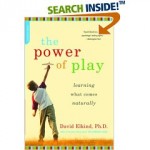 A recent book by developmental psychologist David Elkind is entitled The Power of Play, and I would recommend it to parents, educators, psychotherapists, and anyone else who has an interest in play and children. David Elkind was a disciple of Jean Piaget, the great French structuralist thinker who changed people’s conceptions of how children think. In this book he explains how play changes as a child moves through different cognitive stages. In infancy, play is sensori-motor, a matter of wiggling limbs and exploring the world through the baby’s senses. Toddlers like to repeat play experiences over and over again as they experience a sense of mastery over their environment. Preschoolers enjoy dressing up in cast-off clothes and pretending to be kings, princesses, and ogres. Once children have reached Piaget’s stage of concrete operations (Elkind calls this “the age of reason”), they enjoy playing games that have rules to them, and may spend as much time arguing about the rules, and determining what is “fair,” as in following them. Older elementary school children enjoy creating their own forts and spaces where they can cooperative, compete, or just get away from others and experience some well-deserved privacy.
A recent book by developmental psychologist David Elkind is entitled The Power of Play, and I would recommend it to parents, educators, psychotherapists, and anyone else who has an interest in play and children. David Elkind was a disciple of Jean Piaget, the great French structuralist thinker who changed people’s conceptions of how children think. In this book he explains how play changes as a child moves through different cognitive stages. In infancy, play is sensori-motor, a matter of wiggling limbs and exploring the world through the baby’s senses. Toddlers like to repeat play experiences over and over again as they experience a sense of mastery over their environment. Preschoolers enjoy dressing up in cast-off clothes and pretending to be kings, princesses, and ogres. Once children have reached Piaget’s stage of concrete operations (Elkind calls this “the age of reason”), they enjoy playing games that have rules to them, and may spend as much time arguing about the rules, and determining what is “fair,” as in following them. Older elementary school children enjoy creating their own forts and spaces where they can cooperative, compete, or just get away from others and experience some well-deserved privacy.
The problem with today’s society, according to The Power of Play, is that these natural play experiences are too often disrupted by high-tech products that are being pushed on children at younger and younger ages as manufacturers seek new markets to expand their profits. Elkind derides, for example, Baby Einstein videos and software for children two and under as virtually worthless, and devoid of any research supporting their supposed benefits. He points out that babies do not possess critical thinking capacities. Thus, frequent claims by software designers that these programs will expand a baby’s thinking capabilities are simply wrong. He also criticizes the formal teaching of reading and math in preschool, suggesting that children do not reach Piaget’s stage of concrete operations until five to seven years of age, and that children can’t really understand that a number or letter is both a part of the number or alphabet system, but also that it’s value changes depending upon where it is in relationship to other numbers or letters (e.g. an “e” is both a letter of the alphabet, but also a sound value that changes depending upon where it is in a word, as in “fine” “fen” “feign” etc.).
Elkind criticizes parenting and schooling approaches that utilize any of three “theories” of learning. The “watch me” theory: that somehow by looking at what the parent or teacher is doing the child will figure out how to do the skill. The “little sponge” theory: that children can just soak up any kind of learning that we throw at them no matter who they are, or what age they are. And the “look harder” theory: the idea that if we just tell kids to “look!” they will “get it.” This is like yelling at a blind person. Children move through different stages of growth at different rates, and they need parents and teachers who will watch them learn, and listen to them, and help them move from where they are in their understanding of a skill or subject, to the next step of whatever they are learning.
All in all, The Power of Play is an excellent read. I hadn’t enjoyed an education book so much since reading John Holt, George Dennison, Herb Kohl, and Jonathan Kozol’s books on open education when I was in my twenties back in the early 1970’s. I recommend that people read this book, and use its recommendations (it includes suggestions for creating rich early childhood education environments based on play) to refute the encroaching high-tech world of toys and software that leave so little to the imagination and that leave our children getting ever more obese.
For more information about the importance of play in the development of the child, and the need to incorporate it into school life, see my book If Einstein Ran the Schools: Revitalizing U.S. Education
This article was brought to you by Thomas Armstrong, Ph.D. and www.institute4learning.com.
Follow me on Twitter: @Dr_Armstrong
This post brought to you by Thomas Armstrong, Ph.D. and www.institute4learning.com
Follow me on Twitter: @Dr_Armstrong



















